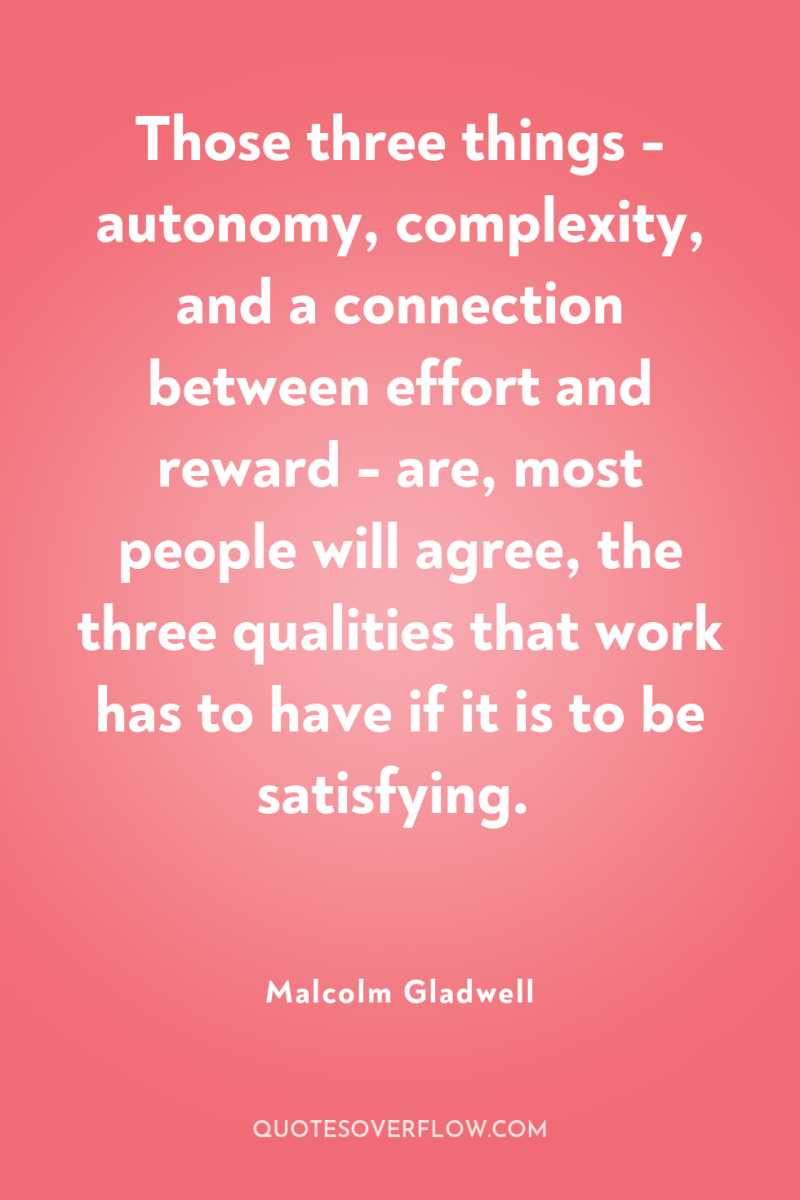
1
Those three things - autonomy, complexity, and a connection between effort and reward - are, most people will agree, the three qualities that work has to have if it is to be satisfying.Malcolm Gladwell
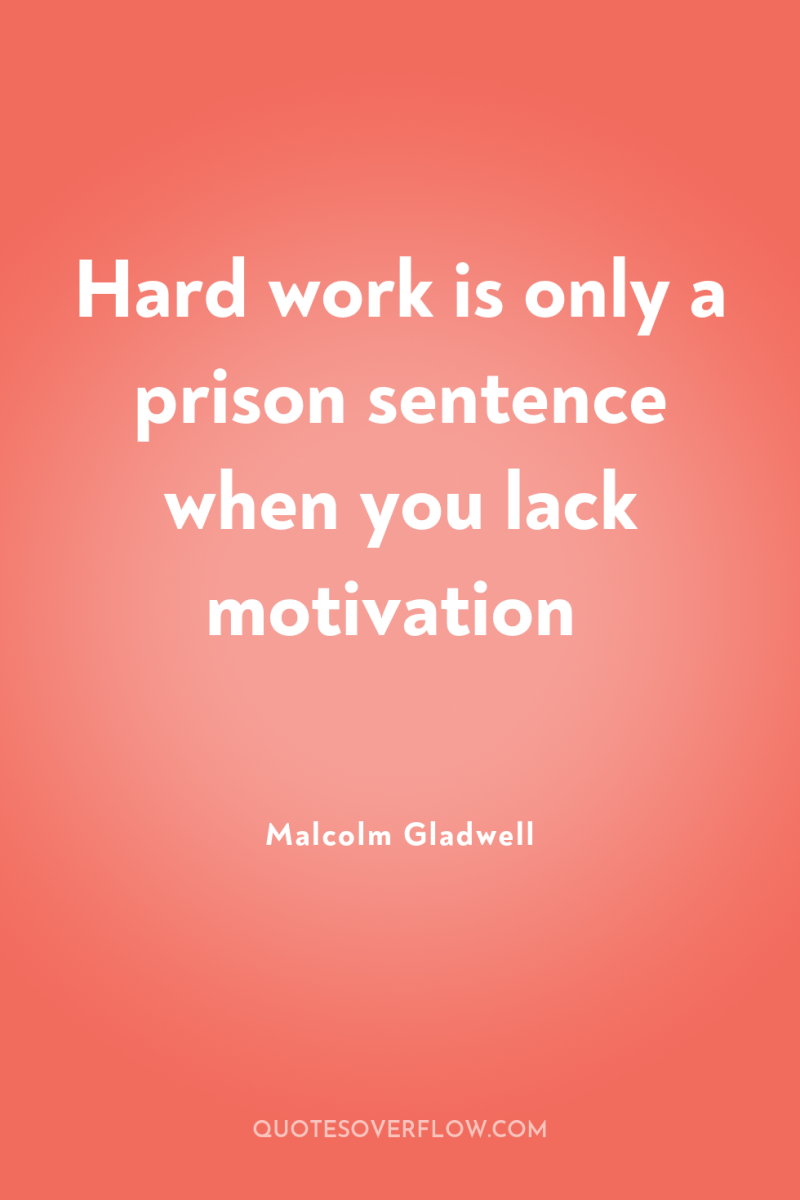
2
Hard work is only a prison sentence when you lack motivationMalcolm Gladwell
3
The people who stand before kings may look like they did it all by themselves. But in fact they are invariably the beneficiaries of hidden advantages and extraordinary opportunities and cultural legacies that allow them to learn and work hard and make sense of the world in ways others cannot. It makes a difference where and when we grew up. The culture we belong to and the legacies passed down by our forebears shape the patterns of our achievements in ways we cannot begin to imagine. It's not enough to ask what successful people are like, in other words. It is only by asking where they are from that we can unravel the logic behind who succeeds and who doesn't.Malcolm Gladwell
4
The striking thing about Ericsson’s study is that he and his colleagues couldn’t find any ‘naturals, ’ musicians who floated effortlessly to the top while practicing a fraction of the time their peers did. Nor could they find any ‘grinds, ’ people who worked harder than everyone else, yet just didn’t have what it takes to break the top ranks. Their research suggests that once a musician has enough ability to get into a top music school, the thing that distinguishes one performer from another is how hard he or she works. That’s it. And what’s more, the people at the very top don’t work just harder or even much harder than everyone else. They work much, much harder. The idea that excellence at a complex task requires a critical minimum level of practice surfaces again and again in studies of excellence. In fact, researchers have settled on what they believe is the magic number for true expertise: ten thousand hours.Malcolm Gladwell
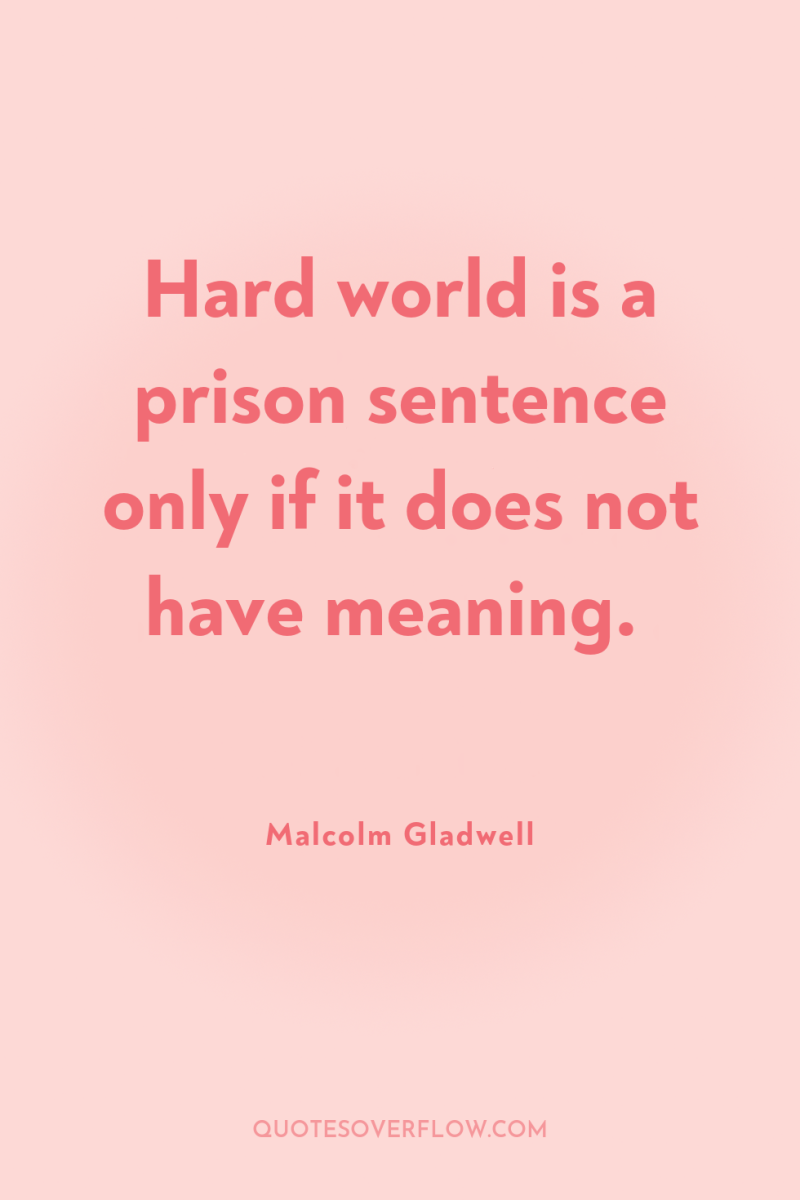
5
Hard world is a prison sentence only if it does not have meaning.Malcolm Gladwell
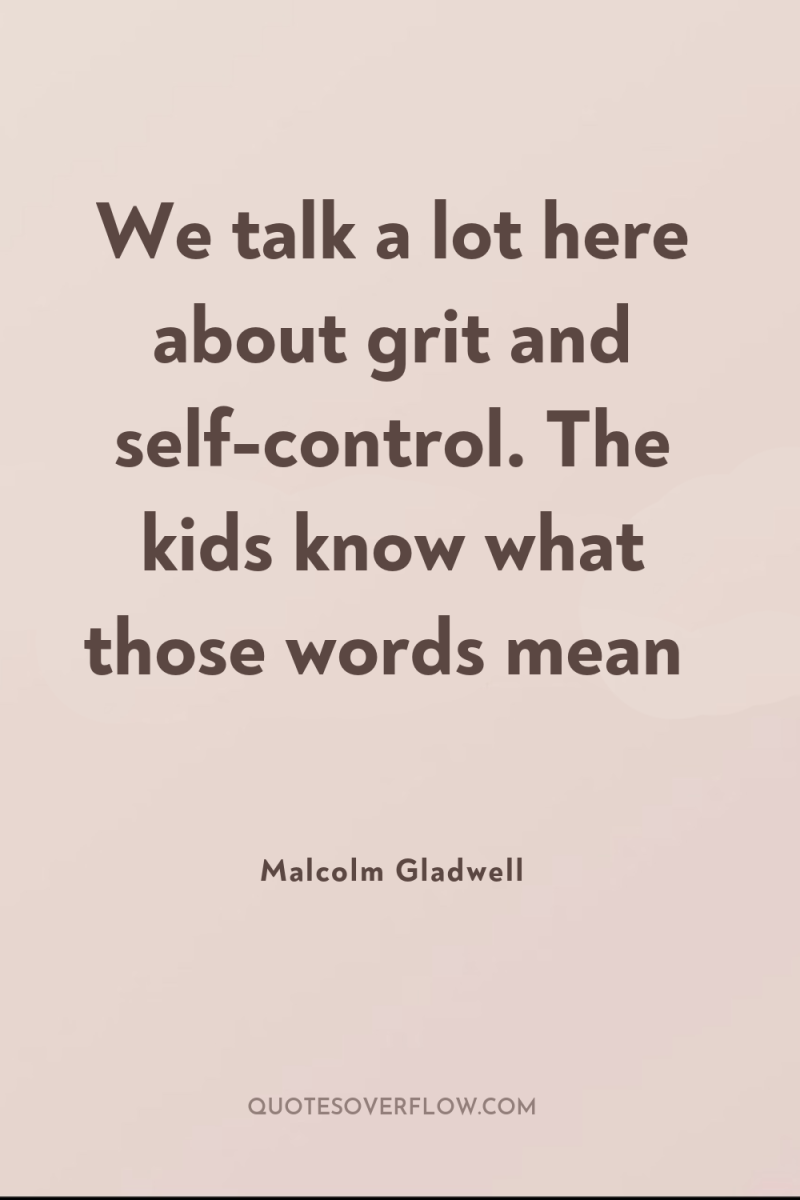
6
We talk a lot here about grit and self-control. The kids know what those words meanMalcolm Gladwell
7
. I'm not sure we always respect the mysteries of the locked door and the dangers of the storytelling problem. There are times when we demand an explanation when an explanation really isn't possible, and, as we'll explore in the upcoming chapters of this book, doing so can have serious consequences. 'After the O.J. Simpson verdict, one of the jurors appeared on TV and said with absolute conviction, "Race had absolutely nothing to do with my decision, "' psychologist Joshua Aronson says. 'But how on earth could she know that? What my [and others] research . . show[s] is that people are ignorant of the things that affect their actions, yet they rarely feel ignorant. We need to accept our ignorance and say "I don't know" more often. .Malcolm Gladwell
8
Economists often talk about the 80/20 Principle, which is the idea that in any situation roughly 80 percent of the “work” will be done by 20 percent of the participants. In most societies, 20 percent of criminals commit 80 percent of crimes. Twenty percent of motorists cause 80 percent of all accidents. Twenty percent of beer drinkers drink 80 percent of all beer. When it comes to epidemics, though, this disproportionality becomes even more extreme: a tiny percentage of people do the majority of the work.Malcolm Gladwell
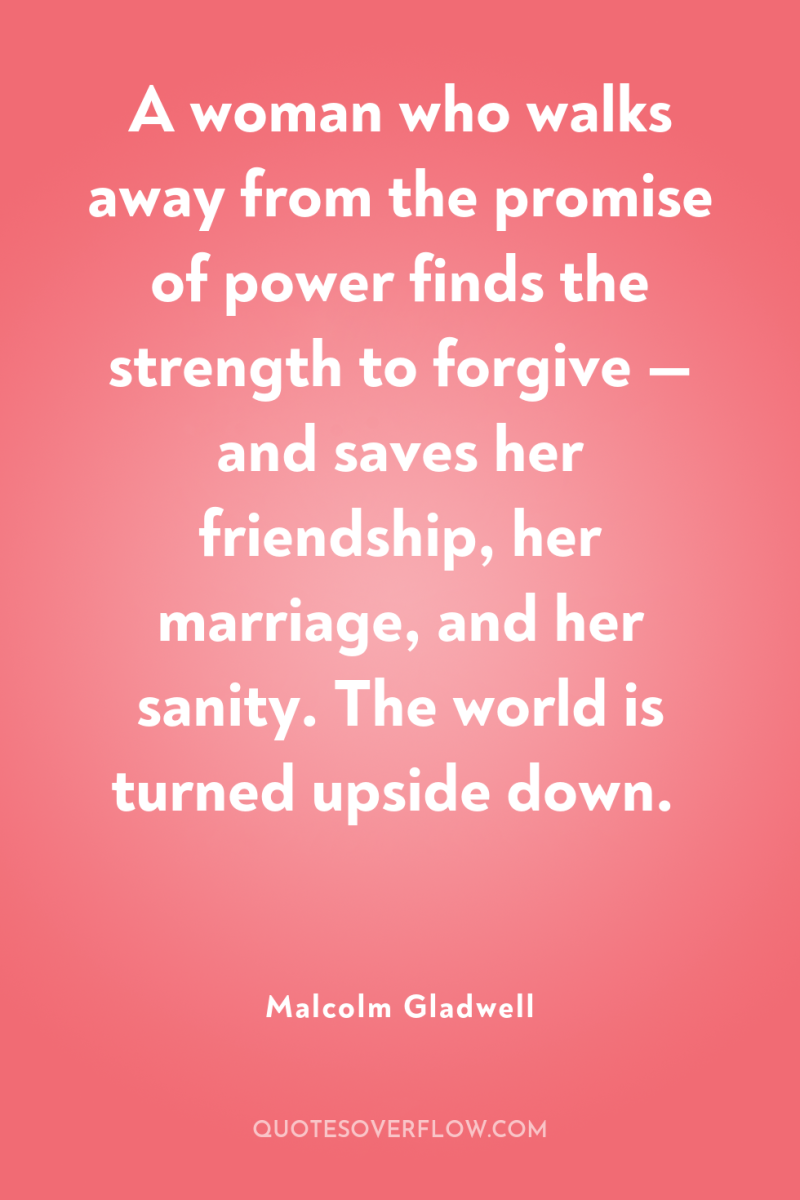
9
A woman who walks away from the promise of power finds the strength to forgive — and saves her friendship, her marriage, and her sanity. The world is turned upside down.Malcolm Gladwell
10
Hard work is a prison sentence only if it does not have meaning.Malcolm Gladwell
11
The entire principle of a blind taste test was ridiculous. They shouldn't have cared so much that they were losing blind taste tests with old Coke, and we shouldn't at all be surprised that Pepsi's dominance in blind taste tests never translated to much in the real world. Why not? Because in the real world, no one ever drinks Coca-Cola blind.Malcolm Gladwell
12
The power of positive thinking will overcome so many thingsMalcolm Gladwell
13
The mistake we make in thinking of character as something unified and all-encompassing is very similar to a kind of blind spot in the way we process information. Psychologists call this tendency the Fundamental Attribution Error (FAE), which is a fancy way of saying that when it comes to interpreting other people's behavior, human beings invariably make the mistake of overestimating the importance of fundamental character traits and underestimating the importance of situation and context.Malcolm Gladwell
14
We have become obsessed with what is good about small classrooms and oblivious about what also can be good about large classes. It’s a strange thing isn't it, to have an educational philosophy that thinks of the other students in the classroom with your child as competitors for the attention of the teacher and not allies in the adventure of learning.Malcolm Gladwell
15
Giants are not what we think they are. The same qualities that appear to give them strength are often the sources of great weakness.Malcolm Gladwell
16
A man employs the full power of the state in his grief and ends up plunging his government into a fruitless and costly experiment. A woman who walks away from the promise of power finds the strength to forgive - and saves her friendship, her marriage, and her sanity. The world is turned upside down. - Chapter 8Malcolm Gladwell
17
... forgiveness is a religious imperative: forgive those who trespass against you. But it is also a very practical strategy based on the belief that there are profound limits to what the formal mechanisms of retribution can accomplish.Malcolm Gladwell
18
Contagiousness is an unexpected property of all kinds of things.Malcolm Gladwell
19
The name given to that one dramatic moment in an epidemic when everything can change all at once is the Tipping Point.Malcolm Gladwell
20
Our first impressions are generated by our experiences and our environment, which means that we can change our first impressions .. . by changing the experiences that comprise those impressions.Malcolm Gladwell
21
Whenever we have something that we are good at--something we care about--that experience and passion fundamentally change the nature of our first impressions.Malcolm Gladwell
22
The power of knowing, in that first two seconds, is not a gift given magically to a fortunate few. It is an ability that we can all cultivate for ourselves.Malcolm Gladwell
23
There is a set of advantages that have to do with material resources, and there is a set that have to do with the absence of material resources- and the reason underdogs win as often as they do is that the latter is sometimes every bit the equal of the former.Malcolm Gladwell
24
So why don’t Americans cheat? Because they think that their system is legitimate. People accept authority when they see that it treats everyone equally, when it is possible to speak up and be heard, and when there are rules in place that assure you that tomorrow you won’t be treated radically different from how you are treated today. Legitimacy is based on fairness, voice and predictability, and the U.S. government, as much as Americans like to grumble about it, does a pretty good job of meeting all three standards. Pg. 293 .Malcolm Gladwell
25
Emotion goes inside-out. Emotional contagion, though, suggests that the opposite is also true. If I can make you smile, I can make you happy. If I can make you frown, I can make you sad. Emotion, in this sense, goes outside-in.Malcolm Gladwell
26
I've been in auditions without screens, and I can assure you that I was prejudiced. I began to listen with my eyes, and there is no way that your eyes don't affect your judgement. The only true way to listen is with your ears and your heart. (p.251)Malcolm Gladwell
27
Living a long life, the conventional wisdom at the time said, depended to a great extent on who we were–that is, our genes. It depended on the decisions we made–on what we chose to eat, and how much we chose to exercise, and how effectively we were treated by the medical system. No one was used to thinking about health in terms of community.Malcolm Gladwell
28
We form our impression not globally, by placing ourselves in the broadest possible context, but locally, by comparing ourselves to people in the same boat as ourselves.Malcolm Gladwell
29
[Research] suggests that what we think of as free will is largely an illusion: much of the time, we are simply operating on automatic pilot, and the way we think and act — and how well we think and act on the spur of the moment — are a lot more susceptible to outside influences than we realize.Malcolm Gladwell
30
The notion that the only way you can critically engage with a person’s ideas is to take a shot at them, is to be openly critical – this is actually nonsense. Some of the most effective ways in which you deal with someone’s idea are to treat them completely at face value, and with an enormous amount of respect. That’s actually a faster way to engage with what they’re getting at than to lob grenades in their direction… If you’re going to hold someone to what they believe, make sure you accurately represent what they believe.Malcolm Gladwell
31
If you are a white person who would like to treat black people as equals in every way–who would like to have a set of associations with blacks that are as positive as those that you have with whites–it requires more than a simple commitment to equality. It requires that you change your life so that you are exposed to minorities on a regular basis and become comfortable with them and familiar with the best of their culture, so that when you want to meet, hire, date, or talk with a member of a minority, you aren’t betrayed by your hesitation and discomfort. Taking rapid cognition seriously--acknowledging the incredible power, for good and ill, that first impression play in our lives--requires that we take active steps to manage and control those impressions.Malcolm Gladwell
32
For every remote miss who becomes stronger, there are countless near misses who are crushed by what they have been through. There are times and places, however, when all of us depend on people who have been hardened by their experiences.Malcolm Gladwell
33
Once a musician has enough ability to get into a top music school, the thing that distinguishes one performer from another is how hard he or she works. That's it. And what's more, the people at the very top don't work just harder or even much harder than everyone else. They work much, much harder.Malcolm Gladwell
34
For almost a generation, psychologists around the world have been engaged in a spirited debate over a question that most of us would consider to have been settled years ago. The question is this: is there such a thing as innate talent? The obvious answer is yes. Not every hockey player born in January ends up playing at the professional level. Only some do — the innately talented ones. Achievement is talent plus preparation. The problem with this view is that the closer psychologists look at the careers of the gifted, the smaller the role innate talent seems to play and the bigger role preparation seems to play.Malcolm Gladwell
35
Bad improvisers block action, often with a high degree of skill. Good improvisers develop action."(p.115)Malcolm Gladwell
36
To build a better world we need to replace the patchwork of lucky breaks and arbitrary advantages that today determine success...with a society that provides opportunities for all.Malcolm Gladwell
37
Truly successful decision-making relies on a balance between deliberate and instinctive thinking.Malcolm Gladwell
38
Insight is not a lightbulb that goes off inside our heads. It is a flickering candle that can easily be snuffed out.Malcolm Gladwell
39
Basketball is an intricate, high-speed game filled with split-second, spontaneous decisions. But that spontaneity is possible only when everyone first engages in hours of highly repetitive and structured practice--perfecting their shooting, dribbling, and passing and running plays over and over again--and agrees to play a carefully defined role on the court.. .. spontaneity isn't random.Malcolm Gladwell
40
Much of what we consider valuable in our world arises out of (these) one-sided conflicts. Because the act of facing overwhelming odds, produces greatness and beauty.Malcolm Gladwell
41
Six degrees of separation doesn't mean that everyone is linked to everyone else in just six steps. It means that a very small number of people are linked to everyone else in a few steps, and the rest of us are linked to the world through those special few.Malcolm Gladwell
42
The success of any kind of social epidemic is heavily dependent on the involvement of people with a particular and rare set of social gifts.Malcolm Gladwell
43
In the six degrees of separation, not all degrees are equal.Malcolm Gladwell
44
Testers for 7-Up consistently found consumers would report more lemon flavor in their product if they added 15% more yellow coloring TO THE PACKAGE.Malcolm Gladwell
45
That's like being a hockey player born on January I.Malcolm Gladwell
46
Some people look like they sound better than they actually sound, because they look confident and have good posture, " once musician, a veteran of many auditions, says. "Other people look awful when they play but sound great. Other people have that belabored look when they play, but you can't hear it in the sound. There is always this dissonance between what you see and hear" (p.251).Malcolm Gladwell
47
In the general American population, 3.9 percent of adult men are six foot two or taller. Among my CEO sample, almost a third were six foot two or taller.Malcolm Gladwell
48
Do we as a society need people who have emerged from some kind of trauma. And the answer is that we plainly do. There are times and places however when all of us depend on people who have been hardened by their experiences.... [Dr. Freireich] understood from his own childhood experiences that it is possible to emerge from even the darkest hell healed and restored.Malcolm Gladwell
49
In life, most of us are highly skilled at suppressing action. All the improvisation teacher has to do is to reverse this skill and he creates very ‘gifted’ improvisers. Bad improvisers block action, often with a high degree of skill. Good improvisers develop action.Malcolm Gladwell
50
..legitimacy is based on three things. First of all, the people who are asked to obey authority have to feel like they have a voice--that if they speak up, they will be heard. Second, the law has to be predictable. There has to be a reasonable expectation that the rules tomorrow are going to be roughly the same as the rules today. And third, the authority has to be fair. It can't treat one group differently from another.Malcolm Gladwell
51
Cultural legacies are powerful forces. They have deep roots and long lives. They persist, generation after generation, virtually intact, even as the economic and social and demographic conditions that spawned them have vanished, and they play such a role in directing attitudes and behavior that we cannot make sense of our world without them.Malcolm Gladwell
52
The ethics of plagiarism have turned into the narcissism of small differences: because journalism cannot own up to its heavily derivative nature, it must enforce originality on the level of the sentence.Malcolm Gladwell
53
That is the paradox of the epidemic: that in order to create one contagious movement, you often have to create many small movements first.Malcolm Gladwell
54
Acquaintances, in sort, represent a source of social power, and the more acquaintances you have the more powerful you are.Malcolm Gladwell
55
It was not the privileged and the fortunate who took in the Jews in France. It was the marginal and damaged, which should remind us that there are real limits to what evil and misfortune can accomplish. If you take away the gift of reading, you create the gift of listening. If you bomb a city, you leave behind death and destruction. But you create a community of remote misses. If you take away a mother or a father, you cause suffering and despair. But one time in ten, out of that despair rises as indomitable force. You see the giant and the shepherd in the Valley of Elah and your eye is drawn to the man with sword and shield and the glittering armor. But so much of what is beautiful and valuable in the world comes from the shepherd, who has more strength and purpose than we ever imagine.Malcolm Gladwell
56
The paradox of endurance sports is that an athlete can never work as hard as he wants, because if he pushes himself too far, his hematocrit will fall.Malcolm Gladwell
57
When you write about sports, you're allowed to engage in mischief. Nothing is at stake.Malcolm Gladwell
58
The most common form of giantism is a condition called acromegaly, and acromegaly is caused by a benign tumor on your pituitary gland that causes an overproduction of human growth hormone. And throughout history, many of the most famous giants have all had acromegaly.Malcolm Gladwell
59
Do you remember the wrestler Andre the Giant? Famous. He had acromegaly.Malcolm Gladwell
60
There is this tremendous body of knowledge in the world of academia where extraordinary numbers of incredibly thoughtful people have taken the time to examine on a really profound level the way we live our lives and who we are and where we've been. That brilliant learning sometimes gets trapped in academia and never sees the light of day.Malcolm Gladwell
61
You don't train someone for all of those years of medical school and residency, particularly people who want to help others optimize their physical and psychological health, and then have them run a claims-processing operation for insurance companies.Malcolm Gladwell
62
I have profoundly mixed feelings about the Affordable Care Act. What I love about it is its impulse. It attempts to deal with this intractable problem in American health care life, which is that a significant portion of the population does not have access to quality medical care.Malcolm Gladwell
63
When I go to my health club, and it's in the basement, you have to take the elevator down. And this drives me crazy. Why can't there be a stairway? At least make it as easy to exercise as it is to not exercise. It's in society's interest for me to take the stairs.Malcolm Gladwell
64
Part of me thinks that innovation, real innovation in health care delivery, needs to happen from the bottom to the top.Malcolm Gladwell
65
Mainstream American society finds it easiest to be tolerant when the outsider chooses to minimize the differences that separate him from the majority. The country club opens its doors to Jews. The university welcomes African-Americans. Heterosexuals extend the privilege of marriage to the gay community.Malcolm Gladwell
66
The visionary starts with a clean sheet of paper, and re-imagines the world.Malcolm Gladwell
67
Once you understand that Goliath is much weaker than you think he is, and David has superior technology, then you say: why do we tell the story the way we do? It becomes, actually, a far more meaningful and important story in its retelling than in the kind of unsophisticated way we've done it for, I think, too long.Malcolm Gladwell
68
The underdog winning is the romantic position.Malcolm Gladwell
69
The injunction to be nice is used to deflect criticism and stifle the legitimate anger of dissent.Malcolm Gladwell